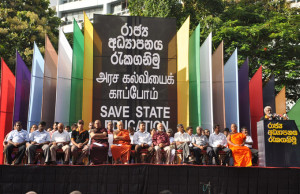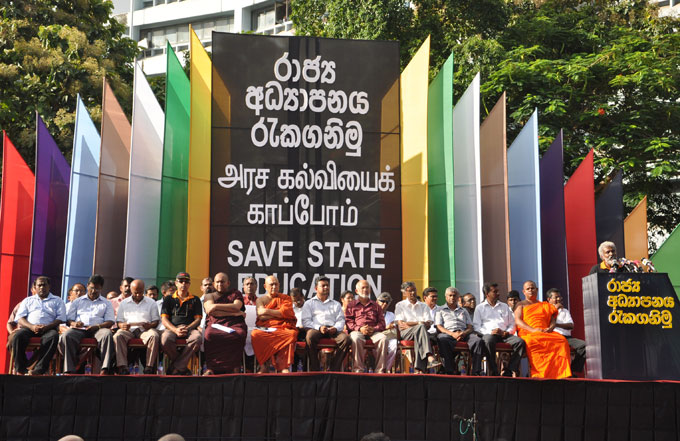 |
| Public meeting organised by FUTA ( file photo) |
The Federation of University Teachers Association (FUTA) requested the Executive and Legislature to withdraw the motion to impeach the Chief Justice.
FUTA statement said that those responsible for the assault on the Secretary to the JSC should be brought to justice and those responsible for the attack on the Mannar Courts should also be brought to justice
Following is the full text of the FUTA statement
“We appeal to our representatives, the Executive and the Legislature, to fulfil their political and legal obligations towards us, and to guarantee respect of the judiciary and to defend their independence. The motion to impeach the Chief Justice should be withdrawn, those responsible for the assault on the Secretary to the JSC should be brought to justice and those responsible for the attack on the Mannar Courts should also be brought to justice.” say some leading academics in Sri Lanka.
The varied types of attacks on the judiciary in Sri Lanka have risen to alarming proportions over the last few weeks and suggest that the very institution of the judiciary is under serious threat in the country. We the undersigned are extremely disturbed by these developments and would like to request that both the Executive and Legislative arms of the state fulfil their duty and guarantee the security and independence of the judiciary. In making this request we would like to remind the government and the public that;
1. ALL public power is derived only from the People (Articles 3 and 4 of the Constitution). As such, public power whether executive, legislative or judicial can only be exercised according to law and the democratic values of a society. Public power can only be exercised for the benefit of the People of Sri Lanka.
2. The ‘benefit of the People’ cannot be equated with a majority view, a majoritarian approach, the political interests of the political party(ies) in power or of a powerful few within a government. Contemporary society world over has accepted that the dignity and equality of all human beings is inherent, inalienable and that protecting that dignity is the primary responsibility of a state. Accordingly the ‘benefit of the People’ can only be understood as a framework for decision making which respects the inherent dignity and equality of ALL people in this nation.
3. Guaranteeing the independence and effective functioning of the judiciary in Sri Lanka is a prerequisite for protecting the dignity of all Sri Lankans. The judiciary are mandated under the Constitution to adjudicate on disputes that arise between private parties and between the state and individuals. It is only in a context where the judiciary can function independently and is also generally perceived as functioning independently that society could expect to live and act according to law.
4. Recent events such as the attack on the Mannar Courts, the assault on the Secretary to the Judicial Service Commission (JSC), understood in the light of the unprecedented public statement issued by the JSC, at the very least, suggests that the judiciary in Sri Lanka is struggling to maintain its independence. Political analysts have gone as far as to suggest that the Executive is directly interfering with the function of the judiciary.
5. Against this background, the motion to impeach the Chief Justice that has been handed over to the Speaker of Parliament is highly suspect. At the face of it, it seems to be evident that the all powerful Executive arm of the government is taking advantage of its position to undermine the judicial arm of the state, through a subservient Legislature. This is a manifest abuse of public power and goes against all accepted democratic norms of government. While the politicians and the political party(ies) in power may seemingly emerge as victors in the short run in this matter, in the long run, neither those politicians, those political parties, the Opposition nor the People would stand to benefit. ALL Sri Lankans will suffer grave consequences due to this interference with the Judiciary.
6. While politicians and political parties in power are understood as being susceptible to act according to prevailing political interests, the judicial arm of a state is designed specifically to defend against all, the law and the spirit of the law. That includes the democratic values of a society and the rights of all persons. In a society where the other arms of the government interferes with that function of the judiciary and is aggressive towards the judiciary, the political sustainability of that society is under threat.
7. The motion to impeach the Chief Justice and the other attacks on the judiciary are but only symptoms of a more alarming, complex and long standing crisis of governance in Sri Lanka. With each new incident the crisis becomes more embedded and widespread. The broader political context in which these incidents have taken place suggest a complex inter-play of different factors characteristic of a society where political patronage, expediency and convenience are the reference points for exercise of public power rather than democratic principles of governance and the law.
Therefore, we appeal to our representatives, the Executive and the Legislature, to fulfil their political and legal obligations towards us, and to guarantee respect of the judiciary and to defend their independence. The motion to impeach the Chief Justice should be withdrawn, those responsible for the assault on the Secretary to the JSC should be brought to justice and those responsible for the attack on the Mannar Courts should also be brought to justice.
Signatories
1. Dr Ranil Abayasekera (University of Peradeniya)
2. Dr Harini Amarasuriya (The Open University of Sri Lanka)
3. Prof Samuel Anbahan Ariadurai (The Open University of Sri Lanka)
4. Dr KKIU Arunakumara (University of Ruhuna)
5. Prof Navaratna Bandara (University of Peradeniya)
6. Dr G Bandarage (The Open University of Sri Lanka)
7. Dr Nirmal Ranjith Dewasiri (University of Colombo)
8. Prof Priyan Dias (University of Moratuwa)
9. Dr Lesly Ekanayake (University of Moratuwa)
10. Dr GWAR Fernando (The Open University of Sri Lanka)
11. Mr Rohan Fernando (The Open University of Sri Lanka)
12. Dr Theodore Fernando (The Open University of Sri Lanka)
13. Dr Hans Gray (University of Moratuwa)
14. Dr Ranil Guneratne (University of Colombo)
15. Dr Dileni Gunewardene (University of Peradeniya)
16. Dr Jinasena Hewage (University of Ruhuna)
17. Prof Rohini Hewamanne (University of Colombo)
18. Dr Rangika Halwatura (University of Moratuwa)
19. Prof OA Illeperuma (University of Peradeniya)
20. Dr Prabhath Jayasinghe (University of Colombo)
21. Dr Janaki Jayawardena (University of Colombo)
22. Dr Barana Jayawardana (University of Peradeniya)
23. Dr Romaine Jayawardena (University of Colombo)
24. Dr Ananda Jayawickrama (University of Peradeniya)
25. Mr Nandaka Maduranga Kalugampitiya (University of Peradeniya)
26. Dr Parakrama Karunaratne (University of Peradeniya)
27. Dr Danesh Karunanayake (University of Peradeniya)
28. Assc Prof SR Kodituwakku (University of Peradeniya)
29. Dr Chulantha Kulasekere (University of Moratuwa)
30. Ms Rushira Kulasingham (University of Colombo)
31. Prof Amal Kumarage (University of Moratuwa)
32. Dr Shamala Kumar (University of Peradeniya)
33. Dr Nilantha Liyanage (University of Ruhuna)
34. Dr Sanjeeva Maithripala (University of Peradeniya)
35. Mr Sudesh Mantillake (University of Peradeniya)
36. Dr Suresh de Mel (University of Peradeniya)
37. Dr Mahim Mendis (The Open University of Sri Lanka)
38. Dr Neavis Morais (The Open University of Sri Lanka)
39. Prof Harsha Munasinghe (University of Moratuwa)
40. Dr M M M Najim (University of Kelaniya)
41. Mr Nilhan Niles (University of Moratuwa)
42. Mr Chaminda Pathirana (University of Moratuwa)
43. Prof Milton Rajaratne (University of Peradeniya)
44. Dr Sanath Rajapakse (University of Peradeniya)
45. Mr Rohana Rathnayaka (The Open University of Colombo)
46. Dr Uditha Ratnayake (The Open University of Colombo)
47. Dr A C Ratnaweera (University of Peradeniya)
48. Ms Dinesha Samararatne (University of Colombo)
49. Ms Thanuja Sandanayake (University of Moratuwa)
50. Dr Vajira Namal Seneviratne (University of Colombo)
51. Prof Upul Sonnadara (University of Colombo)
52. Mr Ranil Sugathadasa (University of Moratuwa)
53. Dr Sivamohan Sumathy (University of Peradeniya)
54. Ms Imalka Tennakoon (University of Peradeniya)
55. Prof R O Thattil (University of Peradeniya)
56. Mr Chandraguptha Thenuwara (University of Visual & Performing Arts)
57. Prof Vasanthi Thevanesam (University of Peradeniya)
58. Prof K S Walgama (University of Peradeniya)
59. Dr Ruvan Weerasinghe (University of Colombo)
60. Prof Carmen Wickramagamage (University of Peradeniya)
61. Prof P Wickramagamage (University of Peradeniya)
62. Prof Suren Wijeykoon (University of Moratuwa)
63. Dr KMGG Jayasuriya (University of Peradeniya)
64. Mr APS Fernando (Rajarata University)
Sent by:
Dr. Mahim Mendis
Media Spokesman- FUTA
22nd November 2012
